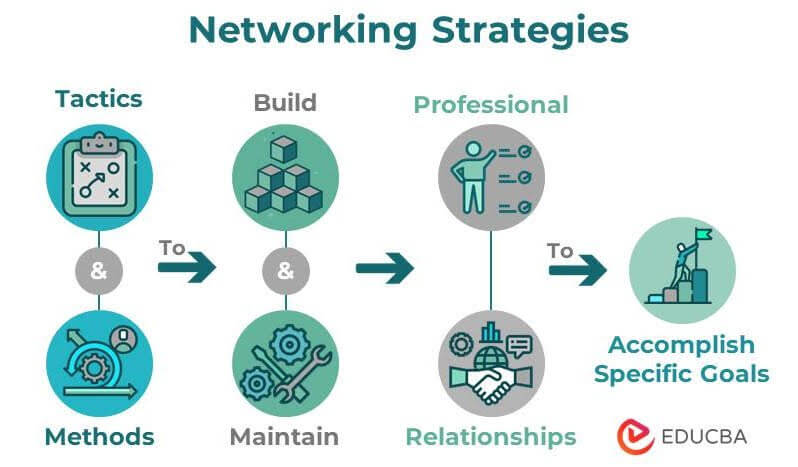In sales, relationships are everything. The ability to build, nurture, and leverage a strong professional network can make the difference between consistent success and struggling to meet quotas. Effective networking isn’t just about collecting business cards or adding LinkedIn connections—it’s about creating meaningful, long-term relationships that lead to opportunities, referrals, and trust.
This guide explores actionable networking strategies that will help salespeople strengthen their connections, gain credibility, and increase sales opportunities.
1. Understand the Power of Networking in Sales
Networking is more than just meeting new people—it’s about building relationships that bring mutual value over time. Strong networks provide:
- Access to Opportunities – Expanding your connections increases your chances of discovering new leads, partnerships, and referrals.
- Trust and Credibility – A referral from a trusted connection is far more effective than a cold call.
- Industry Insights – Engaging with other professionals keeps you informed about market trends, customer challenges, and competitor strategies.
Sales networking isn’t a one-time event but an ongoing process of relationship management.
2. Attend Industry Events & Conferences
One of the best ways to meet potential clients, partners, and influencers is by attending networking events, trade shows, and conferences in your industry. Here’s how to make the most of these events:
Before the Event:
- Research Attendees – Find out who will be there, including potential leads, industry leaders, and competitors.
- Prepare Talking Points – Identify key topics, challenges, and trends that are relevant to the attendees.
- Set Goals – Aim to make a specific number of valuable connections rather than collecting as many business cards as possible.
During the Event:
- Be Approachable & Confident – Maintain good eye contact, offer a firm handshake, and smile.
- Listen More Than You Talk – Show genuine interest in others by asking thoughtful questions.
- Engage in Meaningful Conversations – Focus on learning about the person rather than pitching your product immediately.
- Take Notes – After meeting someone, jot down key points about the discussion to personalize your follow-up.
After the Event:
- Follow Up Quickly – Send a LinkedIn connection request or email within 48 hours.
- Offer Value First – Share an article, industry insight, or introduction to another useful contact.
- Stay in Touch – Keep the relationship alive with occasional check-ins or updates.
3. Leverage LinkedIn for Professional Networking
LinkedIn is one of the most powerful platforms for B2B sales and professional networking. Here’s how to use it effectively:
Optimize Your Profile:
- Use a Professional Photo – First impressions matter.
- Craft a Strong Headline – Clearly state your expertise and how you help clients.
- Write a Compelling Summary – Highlight your achievements, skills, and industry experience.
Engage with Your Network:
- Post Valuable Content – Share insights, industry trends, or success stories that position you as a thought leader.
- Comment & Interact – Engage with potential clients by commenting on their posts and sharing meaningful insights.
- Send Personalized Connection Requests – Instead of generic invitations, include a brief message about why you’d like to connect.
Use LinkedIn Messaging Effectively:
- Avoid direct sales pitches. Instead, start conversations with value-driven messages like:
- “I saw your recent post about [topic] and found it insightful. I’d love to connect and exchange ideas.”
- “I work with companies in [industry] to solve [common problem]. I’d be happy to share some insights if you’re interested.”
Consistency is key—engaging with your network regularly will keep you top of mind when opportunities arise.
4. Build Relationships Through Value-Driven Networking
The best networkers focus on giving rather than just taking. Salespeople who build strong connections don’t just reach out when they need something; they continuously provide value to their network.
Ways to Add Value to Your Network:
- Make Introductions – Connect people who could benefit from knowing each other.
- Share Knowledge & Insights – Send articles, reports, or industry news that might be helpful.
- Offer Free Advice – Provide tips or guidance on industry challenges without expecting immediate returns.
- Celebrate Others’ Successes – Congratulate connections on promotions, awards, or milestones.
Building relationships on mutual benefit creates trust and increases the likelihood of referrals and business opportunities.
5. Master the Art of the Follow-Up
Networking doesn’t end after the first meeting—it’s the follow-up that turns a connection into a relationship.
How to Follow Up Effectively:
- Send a Personalized Message – Reference your previous conversation and express genuine interest in staying connected.
- Offer Something of Value – Share a resource, introduce them to someone, or provide an insight related to their business.
- Stay Consistent – Schedule periodic follow-ups via email, LinkedIn, or a phone call.
Example Follow-Up Email:
“Hi [Name],
It was great connecting with you at [event]! I really enjoyed our discussion about [topic]. Here’s an article I came across that might be helpful.
Let’s stay in touch—would love to continue the conversation over a virtual coffee sometime.
Best,
[Your Name]”*
Effective follow-ups keep relationships warm and open doors for future sales opportunities.
6. Join & Participate in Networking Groups
Being part of professional groups—both online and offline—can significantly expand your reach.
- Industry Associations – Join trade organizations and participate in networking sessions.
- LinkedIn & Facebook Groups – Engage in discussions, share insights, and answer questions to establish expertise.
- Local Business Networks – Attend Chamber of Commerce events or BNI (Business Network International) meetings.
Active participation builds your reputation and increases inbound networking opportunities.
7. Maintain & Strengthen Long-Term Connections
Networking isn’t just about acquiring new contacts—it’s also about nurturing existing relationships. Strong connections can lead to repeat business, referrals, and collaborative opportunities.
Tips to Keep Your Network Engaged:
- Send Occasional Check-Ins – A simple “Hope you’re doing well!” can keep relationships active.
- Offer Help Without Expecting Immediate Returns – Small gestures of generosity strengthen trust.
- Invite People to Events – Hosting webinars or inviting contacts to industry events helps maintain relationships.
Long-term success in sales depends on strong, well-maintained relationships. Investing time in networking will pay off in the form of loyal customers, referrals, and new opportunities.
Final Thoughts
Sales networking isn’t about how many people you meet—it’s about the quality of the relationships you build. By being genuine, adding value, and following up strategically, salespeople can create meaningful connections that drive long-term success.
The key is to be proactive, persistent, and relationship-focused rather than transactional. Over time, a strong professional network will become one of your most valuable sales assets.
Would you like to explore any of these strategies in more depth? Let me know how I can refine or expand on any section!

